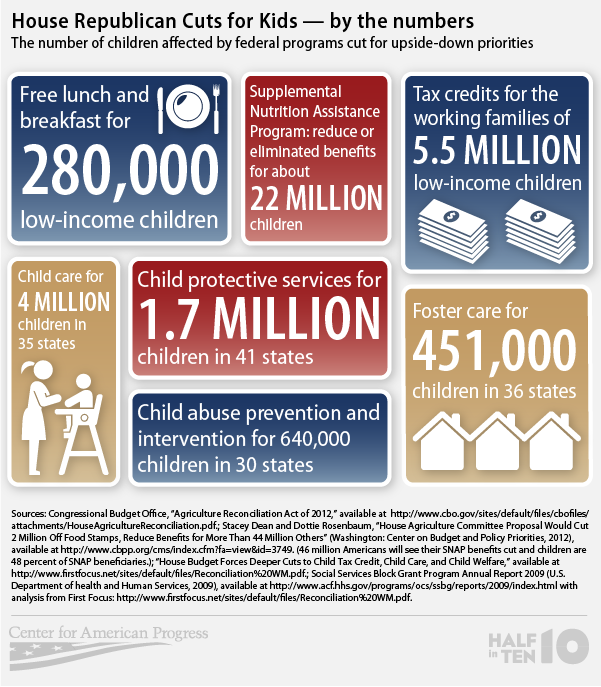Federal budgets are more than numbers on a ledger. They are statements of priorities. And based on the slate of bills recently passed by committees in the House of Representatives, children rank at the bottom of the list.
The House budget for fiscal year 2013 tasks several congressional committees to “reduce lower‐priority spending” to avert military cuts that will otherwise take place in January 2013 due to the debt deal agreed to last summer. Based on these committees’ decisions, it’s safe to assume that children are considered a “lower priority” than the many other places House leadership could have found necessary savings.
The House Agriculture Committee, for example, could have found savings by reforming subsidies to wealthy farmers. The House Ways and Means Committee could have found its savings from closing tax loopholes for oil companies and hedge fund managers. But both committees decided that services for our most vulnerable children should be first and foremost on the chopping block.
By the numbers, here’s a fast glance at how many children will be affected should these cuts be enacted:

Now that’s a lot of children who would be vulnerable to hunger, abuse, and neglect if the House budget were to be enacted today. Here are the details:
- The House Committee on Agriculture found 100 percent of its savings from cutting the Supplemental Nutrition Assistance Program. Nearly half (48 percent) of the program’s 46 million participants are children. And because the House budget included cuts to a provision that coordinates this essential nutrition assistance with other safety net programs, 280,000 children would no longer be automatically eligible for free school breakfast and lunch. Not being hungry is a prerequisite for learning. This federal program reduced the number of children living in extreme poverty by half last year, helping our least fortunate children gain a leg up in school so they can contribute meaningfully to our society and economy in the future.
- The House Ways and Means Committee axed programs that help abused or neglected children and gutted programs that help low-income working families with kids. The committee eliminated the Social Services Block Grant, which helps over 11 million kids through funding to states for services such as child abuse prevention and intervention, foster care, and child protective services. What will happen to these children if states cannot make up for the gaps left by these cuts? Think about it.
These cuts are not only immoral—they are also bad economic policy. Child poverty alone costs our economy upwards of $500 billion a year in lost productivity, increased health care costs, and expenditures in the criminal justice system. Poor childhood nutrition leads to a host of negative consequences including increased instance of chronic diseases, lower educational achievement, and a less-skilled workforce of the future—all of which will ultimately undermine our economic competitiveness.
In contrast, higher taxes on the wealthy would not harm economic growth.
As the full Congress moves forward with plans to reduce the federal budget deficit in FY 2013, they should reconsider which investments are “lower priority.” Cutting programs that feed, protect, and nurture low-income kids is not the way to cut the deficit.
Melissa Boteach is Director of the Half in Ten project—cutting poverty in half in 10 years—at the Center for American Progress Action Fund.